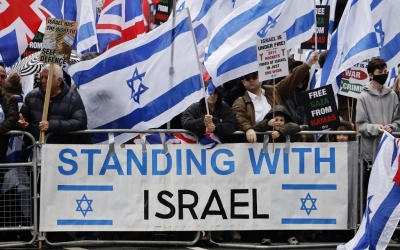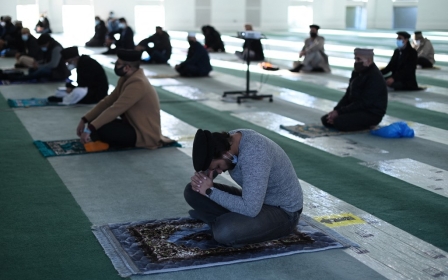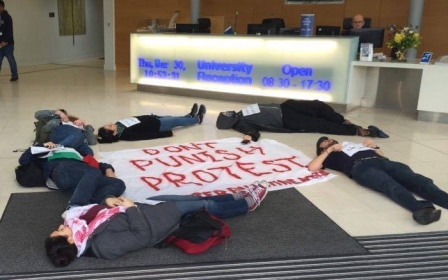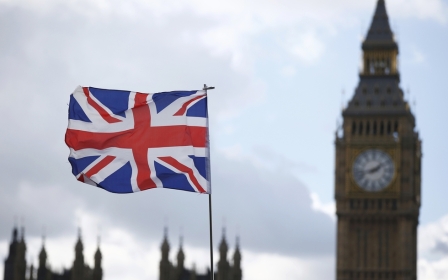Why pro-Palestine activists are targeted in British schools and society

Images of children being pulled from rubble, families forcibly evicted from their homes, and al-Aqsa Mosque raided by soldiers as worshippers prayed during Ramadan have dominated social media in recent weeks.
Streets have been flooded with protesters chanting “free Palestine”, with the Palestinian flag waved as a symbol of solidarity from London to New York to Karachi.
British youths joined their families and friends in one of the largest turnouts for the Palestinian cause in recent years. But as they returned to schools on Monday, expressions of Palestinian solidarity were silenced, referred to the the government's Prevent programme or carefully managed in order to find a “middle ground” on the Israel-Palestine “conflict”.
All of these actions serve to maintain a status quo narrative on Israel that both depoliticises legitimate anger towards Israel’s settler-colonial project, and portrays Palestinian resistance (through the spectre of Hamas and political Islam) as an equal shareholder in violence.
Such 'controversial' or politically charged topics often exist outside of school curriculums and carefully curated lesson plans
To accuse Israel of genocide and apartheid is framed as impeding the possibility for “peace” at best, and as an outright call to violence at worst. A glaring example is the case of Irfan Chishti, a British imam paid by local authorities to train public bodies in “countering radicalisation”.
New MEE newsletter: Jerusalem Dispatch
Sign up to get the latest insights and analysis on Israel-Palestine, alongside Turkey Unpacked and other MEE newsletters
The UK Home Office has launched an inquiry into Chishti, accusing him of potentially “damaging community relations and undermining Prevent’s important work” after he labelled Israel a “terrorist state”.
The British government’s reaction towards pro-Palestinian activities is particularly unsettling in schools. In one video that has circulated on social media, a headteacher in Leeds likened the Palestinian flag to a “call to arms”. Schools have urged students to remain impartial and to consider “both sides” of the debate. Such “controversial” or politically charged topics often exist outside of school curriculums and carefully curated lesson plans.
Both-sides approach
Over the weekend, the education minister, Gavin Williamson, also weighed in on the matter, asserting that “schools should not work with or use materials from organisations that publicly reject Israel’s right to exist”. He went on to warn that schools must have “political impartiality”.
Teachers and students have been advised to engage with an organisation called Solutions Not Sides, which advocates a bipartisan, both-sides-equal approach to the Israeli occupation, as indicated by its tagline: “Not simply pro-Israel or pro-Palestine; above all, pro-solution.” This equalising narrative, as journalist Ben White argues, “at worst… aims to undermine Palestine solidarity activism by exploiting concerns over ‘extremism’”.
The incidents recently witnessed in British schools could be easily dismissed as a product of poor training among teachers who might not be equipped to deal with such conversations around Israel and Palestine in the classroom. While this could be true, the matter is complicated when we consider how the Prevent duty functions in schools.
Under the Prevent duty, an educator is obliged to refer students they believe are at risk of extremism and radicalisation. Prevent’s racialising tendencies have resulted in Muslims being disproportionately referred to the programme due to the persistent association between Muslims and terrorism.
Supporters of Prevent will say that its purpose is to encourage debate, but this is impossible when the circumstances governing such debates in the classroom feed into a securitised framework. According to the Palestine in Schools team, there has been a rapidly growing number of cases where children are being spoken to and surveilled through the lens of Prevent.
Palestine’s occupation can be seen in part as a religious issue for Muslims, especially given the presence of al-Aqsa Mosque - one of the three major holy sites in Islam, alongside Mecca and Medina. Expressions of Palestinian solidarity can then cross the fabricated divide between religious and political rhetoric. All of this makes Palestine a particularly contentious issue in the eyes of counter-extremism programmes: if Muslim political grievances are already "risk factors", then Palestine is the quintessential risky cause, particularly when the conflation of antisemitism and anti-Zionism comes into play.
Counter-terrorism discourse
Palestinian resistance to Israeli occupation has been central to the formation of the contemporary counter-terrorism discourse, whereby Palestinian attacks are uniquely recorded as “terrorism”, while Israeli assaults are not.
The inclusion of Prevent in schools means that conversations around Israel and Palestine cannot happen without the fear of a referral taking place. Over the years, pro-Palestinian activism has been a concern for counter-extremism officials, as in the 2016 case of teenager Rahmaan Mohammadi, who was questioned by anti-terrorism police for wearing a “Free Palestine” badge to school.
What is happening to Palestinians has awakened a new generation whose voices can no longer be stifled
Similarly, universities have been asked to “manage” Palestinian activism. Even if a Prevent referral has not occurred, the prospect is a concern for parents and guardians. The shadow of Prevent in schools has serious implications for the future of activism and protest, especially in light of the Police, Crime, Sentencing and Courts Bill, which would grant police new powers to place restrictions on protests.
As protests unfold in our schools and our streets, it’s time to work towards abolishing Prevent in the short term, and destigmatising legitimate accusations against Israel in the longer term. What is happening to Palestinians has awakened a new generation whose voices can no longer be stifled.
The views expressed in this article belong to the author and do not necessarily reflect the editorial policy of Middle East Eye.
Middle East Eye delivers independent and unrivalled coverage and analysis of the Middle East, North Africa and beyond. To learn more about republishing this content and the associated fees, please fill out this form. More about MEE can be found here.





